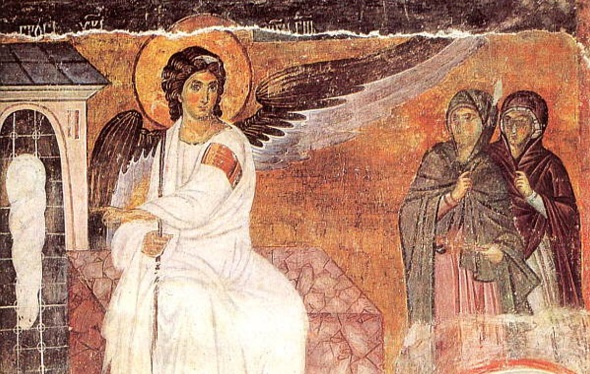Christ’s descent into the tenebrous realms of death – Part 2
22 April 2014The soul will never lose its sense of being, that is, of existence, but it has two possibilities. It can either feel its existence as ‘well-being’ or as ‘ill-being’. Saint Gregory Palamas says that everyone sees God. Everyone will see the uncreated Light of the Divinity, but half of them will rejoice, exult, celebrate and be delighted, and say: “How wonderful, how good, how pleasant, what a joy this is!’. The other half will burn, will suffer, will writhe and say: ‘Alas. What a disaster for me’. Can we perhaps understand something of this even from a distance? We’ve all of us had the flu or an infection at some time.
If we have one of these, we don’t go out in the sun because it’s too much for us. We start coughing and sneezing, our eyes water and we have a ‘nasal discharge’, mucous, we shiver and say: ‘For goodness’ sake. Let me get indoors where the sun won’t bother me’. The person next to us, who’s hale and hearty, is enjoying the sunshine: ‘Thank God for a fine day. Nice and sunny. Let’s sit here and warm our bones, take a breather and enjoy the day’. It’s not the sun’s fault. It’s the same for one person and the next. It’s the fault of the flu. It’s the flu, the infection, that sends one of the two people inside. It’s the same here with sin, unrepentance, lack of faith and atheism. That’s the sickness that makes it impossible for people to bear the spiritual Sun of Righteousness and say ‘Oh dear, oh dear’, at the same time as others are saying ‘Isn’t this great?’
So we’ve venerated, we’ve followed the funeral of Life, we’ve sung the very lyrical Praises, which bear the firm stamp of folk poetry and, particularly- without a trace of chauvinism- of the Greek heart, Greek sensibility. All the other services very likely reflect all other national attitudes and psychologies. But the Praises have that sensitivity, that delicacy, which isn’t merely Mediterranean but more particularly Greek. That longing, that warmth of the Greek mother. When you hear Our Most Holy Lady lamenting her Son in the Praises, you can feel that it’s a Greek mother mourning her son. [The Greek poet Ioannis] Ritsos was influenced by this when he wrote the Epitafio; [Mikis] Theodorakis set it to music on the basis of the Praises, and so it goes on. It’s these hymns that play most hauntingly on the finest strings of the heart of the Greek Orthodox Christian.
So we’ve followed the formal cortege of the funeral of Life ‘in the hope of the resurrection’. Not His. We’re certain of that. We celebrate that 365 days of the year. There’s no day when the Church forgets or doesn’t celebrate the Resurrection. It preached Christ Crucified, but also Resurrected from the dead.
We’ve already reached the temporary abeyance of Great Saturday. ‘Life slumbers’ and in the evening the bells will summon us to celebrate the Resurrection of Christ from the dead. Let us pray that the Lord will also prepare our own resurrection, and that it will be a resurrection not unto judgment and condemnation but unto eternal life, reigning with Him, together the whole of the Holy Trinity, the Father without beginning and the co-eternal Holy Spirit; together with Our Most Holy Lady, the Mother of God; together with all the Saint, the protectors of the Monastery [Grigoriou, on the Holy Mountain], Saints Nicholas, Anastasia the Roman, and Gregory; the guardian angels of us all, together with all the angels and archangels. And may we rejoice in that blessed joy of the Kingdom, where there is the ‘clear sound of those celebrating and crying ceaselessly: Lord, glory to you’.
Source. The periodical Ο Όσιος Γρηγόριος, no. 34.






